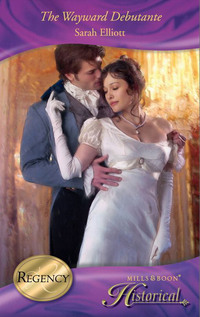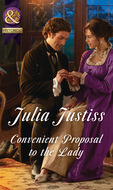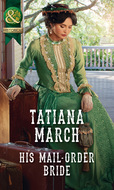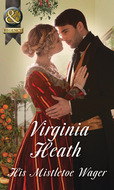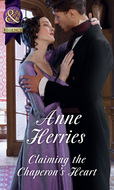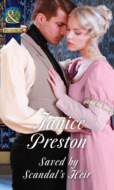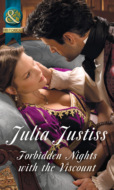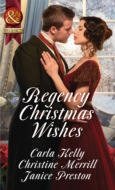Raamatut ei saa failina alla laadida, kuid seda saab lugeda meie rakenduses või veebis.
Loe raamatut: «The Wayward Debutante»
Praise for Sarah Elliott
‘Sarah Elliott writes with elegance and wit.’—bestselling author Jessica Benson
REFORMING THE RAKE
‘A fun, frothy story! Charming!’—New York Times bestselling author Eloisa James
‘A deliciously sexy romance, [Elliott’s] deftly written debut will delight readers with its wonderfully endearing characters and wickedly sharp wit.’—Booklist
THE RAKE’S PROPOSAL
‘Elliott pulls in her readers from the first page and keeps them interested until the final mystery is solved. Her attention to detail and cast of characters keep the reader well entertained and eager for more.’—RT Book Reviews
‘A very well-written book with engaging characters—a joy to read.’—The Romance Readers Connection
‘Where did you learn to kiss?’
‘I…Well…’
‘It occurs to me that somehow, in between your French lessons, you neglected kissing entirely,’ he said. ‘It would be cruel of me to let you go without a lesson.’ He began walking towards her. She should have run, but instead she raised her chin, too proud to let him intimidate her.
‘Thank you, but I do not need a lesson, Mr Bentley.’
‘Oh, but I think you do.’
He reached for her at this point, but still she held her ground. His dark gaze roamed boldly over her face.
‘First we’ll have to take that ridiculous thing off your head.’
She stayed very still as he gently lifted the wig, desperately trying to ramp down the feelings churning inside her.
‘Now, that’s much better. Do you know how long I’ve wanted to kiss you?’
The Wayard Debutante
Sarah Elliott

SARAH ELLIOTT grew up in Pennsylvania and studied English at Smith College. She moved to London in 2003 and lives there still. In addition to writing, Sarah enjoys cooking, art, antiques, and classic films. She loves to hear from readers and can be contacted at sarah@sarahelliott.net
Previous novels by this author:
REFORMING THE RAKE
THE RAKE’S PROPOSAL
THE EARL AND THE GOVERNESS
MILLS & BOON
Before you start reading, why not sign up?
Thank you for downloading this Mills & Boon book. If you want to hear about exclusive discounts, special offers and competitions, sign up to our email newsletter today!
Or simply visit
Mills & Boon emails are completely free to receive and you can unsubscribe at any time via the link in any email we send you.
To Meg and Stan: congratulations!
Chapter One
1 July, 1818
“You’ve always been so good, Eleanor,” Beatrice Summerson said appreciatively as her eighteen-year-old sister entered the sunny drawing room bearing a silver tea tray. “Between Ben and Helen and me it’s a mystery how you ended up so well behaved. Father thinks of you as an absolute miracle.”
“Oh, I don’t know…I’m not so good,” Eleanor replied as she laid the tray on a side table. She began organizing its contents without looking at her sister.
Beatrice cocked her head, her eyes slightly worried. “Now, now, you mustn’t protest. You’re perfect, and you couldn’t be a more agreeable guest. Charles and I are grateful to have you.”
“I hope so,” Eleanor said uncertainly. “Would you like a slice of cake, Beazie?”
Beatrice smiled, her concerns momentarily allayed by the prospect. “Well…I am eating for two at the moment.”
Eleanor cut a very large slice, and brought it to her sister, who patted the spot next to her on the yellow damask sofa. “Do have a seat, Eleanor. I’ve been wanting to talk to you.”
Slowly, Eleanor sat. “Oh?”
“Well…I’ve been feeling rather guilty. I know it might seem that Charles and I are terribly busy and distracted with Mark, and with the new baby on the way, but I hope you don’t feel too neglected.”
Eleanor looked down at her lap. “I can entertain myself all right.” There was, she hoped, a melancholic note to her voice.
“And our household must feel very chaotic to you at the moment,” Beatrice continued apologetically. “It’s such a shame that our butler, Cummings, absconded with our downstairs maid. We’re completely disorganized as a result, and I’ve no time to hire new staff. I’m afraid it’s become a bit of a burden to you. You shouldn’t have to help out as much as you do, especially during your first season.”
Eleanor shrugged. “You’ll get a new maid soon enough. Besides, Cummings was kind enough to recommend his father.”
“Yes,” Beatrice sighed, “but while Mr. Cummings Senior is very polite and correct in his manner he’s also completely deaf.”
Eleanor frowned. “You mustn’t let him go. I’m very fond of him.” Realizing her response seemed disproportionately heated, she added, “He’s kind to me.”
Beatrice narrowed her eyes. “Eleanor? Is something the matter? You’re behaving rather strange.”
It was Eleanor’s turn to sigh. “No, no, Beazie. Everything’s fine. I’ve just been thinking about the ball this evening.”
“You’re looking forward to it, I hope.”
“I’m afraid I am not.”
Beatrice sank back in the sofa. “Nor am I. But we must do what we must do.”
“Would you like more tea?” Eleanor asked, rising.
Beatrice nodded contentedly. “You’re in an obliging mood this morning. Just a drop of milk, please.”
Eleanor poured the tea in silence, then asked hesitantly, “Would you think it the worst thing if I didn’t go tonight?”
“You’re feeling well, aren’t you?”
“Oh, yes. It’s not that. It’s just, you see, a friend of mine asked me to come for a visit, and I already told her I would—”
“A visit on the night of the Montagu-Dawsons’ ball?”
“Miss Pilkington won’t be going to the ball. She took ill yesterday.”
Beatrice cocked her head slightly. “Pilkington? Have you mentioned her before?”
Eleanor smiled patiently. “Yes. Jane Pilkington. I introduced you to her at the Nortons’ party two weeks ago. Surely you remember.”
Beatrice obviously remembered nothing of the sort, but she agreed nonetheless. “Oh, yes. Of course. You know how scatterbrained I can be.”
Eleanor nodded sympathetically. “I met her at the beginning of the season. She’s come all the way from Yorkshire and doesn’t think her family can afford to send her so far from home next season if she doesn’t meet her match this time. So this ball actually meant a lot to her and she’s devastated she’ll have to miss it. She needs cheering up.”
Beatrice frowned. “I understand your sentiments, but I hope her illness isn’t contagious.”
“Oh, no. It’s just a mild cold, and you know what my constitution is like. It’s her spirits, really, that suffer most. I know I should go to the ball, but I’m sure I won’t be missed in that crush.”
Beatrice shrugged. “I suppose I don’t mind if it’s just this once.”
“Must I go?” her husband, Charles Summerson, asked hopefully from the doorway.
She turned around, making a face. “Absolutely. Lady Montagu-Dawson would never forgive us if we all deserted.”
He groaned and sank down into a chair. “Doesn’t seem a bit fair. Eleanor’s the only reason we’re going in the first place.”
Eleanor sniffed resentfully. “You’ve no idea how fair—produce a sick friend yourself and then you may complain. Besides, I’m the one who’s been to some affair nearly every day for the past two months, aren’t I?”
“She’s right, Charles.” Beatrice stepped in to defend her. “Eleanor is willing to go, but she’s sacrificing her time to help her friend. You, on the other hand, haven’t an unselfish bone in your body.”
Charles regarded Eleanor with mild skepticism but didn’t comment. Beatrice turned her attention back to her sister, concern again on her face. “Are you not enjoying yourself anymore? I’m sorry, but I haven’t even asked you until today…it’s just that you always seemed so eager to have your first season and I only assumed…”
Eleanor hadn’t been enjoying her season for some time now, but she wasn’t going to admit it. “Of course I’m having a good time, a splendid time. Really. I only said that because I’ve been overcommitting myself recently.”
“You’re lucky you’re staying with Charles and me rather than with Aunt Louisa—she’d have you go tonight even if you were the sick one.”
Eleanor knew that was true and said a silent prayer of thanks that she’d avoided lodging with her domineering great-aunt. “As it is Aunt Louisa hardly leaves me alone. Every time I see her she asks me why I’m not engaged yet, knowing, of course, that no one’s asked me. She called me a disappointment the last time I saw her.”
“She didn’t!” Beatrice gasped in outrage.
“She did, too—said everyone expected better things of me. I’m trying, Beatrice, really—” She broke off, allowing her lip to tremble convincingly. “I’m not like you, Bea…six proposals in your first season alone…”
Beatrice blushed. “Oh, come, now. We all know you’re trying. You deserve a night off, and it sounds as if Miss…oh…”
“Pilkington.”
“Yes. Miss Pilkington could use your company. Go right ahead.”
Eleanor suppressed the urge to crow with joy. Instead, she folded her hands demurely. “You are the best sister in the world. Jane’s sending her carriage round later and I’ll also be driven home, so you’ve nothing to worry about.”
“I never worry about you, Eleanor. If you were our dear sister Helen, on the other hand, I’d be worried indeed. But not you.”
“Really?” Eleanor should have been pleased her sister thought so highly of her, but instead she was rather disappointed. Being sensible and dependable was all very well, but…
For a moment they sat without speaking, the only sound provided by Beatrice finishing off her cake. Eleanor began to drum her fingers on her lap. Catching herself, she said, “Oh, my.”
“Yes?” Beatrice asked, her fork poised midair.
“The time, Bea. You’re going to be late.”
“Oh, dear. You’re right. When will I learn?” She deposited her plate on a small satinwood table and Charles helped her rise. As they walked to the door, Beatrice turned around to remark, “By the by, those items arrived from Father’s house early this afternoon. Meg brought them to your room. What on earth do you intend to do with all those clothes? They’re not suitable to wear.”
“Probably planning to rope us into more of her drawing room theatricals,” Charles suggested. “Don’t think for one moment that you’ll get me into that blond wig, Eleanor.”
She grinned, imagining her tall, handsome brother-in-law in the straw-colored woman’s wig that was a staple of her costume collection.
Beatrice just rolled her eyes. “Do try to enjoy yourself with Miss. Pilkington tonight, darling.”
“I will,” Eleanor said, following them out of the room. Indeed, she had a most marvelous evening planned—even if she couldn’t help feeling nervous.
Of course, there wasn’t any Jane Pilkington.
Eleanor started changing her clothes the moment she heard the front door close behind Beatrice and Charles. She didn’t ring for a maid to help. Her wardrobe for the evening was designed to be put on without assistance. A serviceable gray cotton dress with a simple linen collar. Sturdy black boots. The outfit had belonged to a past governess and had been moldering in her father’s attic until she’d rescued it for her costume chest last year. She’d known it would come in useful.
She examined her reflection in the mirror. She looked…passable. She pulled on the blond wig and grimaced. Each of her three siblings was blond. Tall, blond and stunning. Eleanor was quite pretty, she supposed, at least when she wasn’t standing next to one of them. Her hair was brown; she was of medium height; her eyes, at least, were a striking blue. For the time being, however, her less impressive looks were a godsend. She must not be recognized.
She removed the wig and looked away from the mirror with a sigh. I really am a disappointment, she thought as guilt settled over her. As Beatrice had said, she’d always been the good child in the Sinclair family. Ben had been a terrible rake before he’d married, while Beatrice found wedded bliss only after being thoroughly compromised first. Helen promised to be the worst of them and she was only fifteen.
But her family had always assumed that Eleanor would do her duty and wed with relative ease. If only they knew that she didn’t give a fig about getting married, not that anyone seemed interested in proposing to her, anyway. She was far too much the bluestocking, and although men seemed to enjoy her conversation, few glowed with pride to be seen in her presence.
No, the reason she’d longed for a London season was precisely what she was preparing to do tonight. She was going to the theater. It was her favorite thing in the world and had been ever since she’d seen her first play with her family in Bath at the age of nine. She’d have liked nothing more than to be a playwright herself, although that would probably never happen. She’d even like to be an actress, and that would definitely never happen…even though tonight’s performance proved she was perfectly capable.
The closest she’d ever get to these aspirations was sitting in the audience, and since she’d turned sixteen, every trip to London had included as many plays as she’d wanted, provided she could convince a family member to act as chaperone. She’d always imagined her coming-out would basically resemble these earlier trips, but now she was here and Beatrice and Charles were too busy to escort her. A London season, she was dismayed to learn, was serious business. Her life was carefully regimented, and she had little time to attend plays, not unless there was a very good reason to go. The only acceptable reason for her to go anywhere these days was that hordes of eligible men would be there. Getting married took priority.
And she was bored.
So she’d invented Jane. At first, it’d seemed a simple idea: tell Beatrice that she was visiting her dear sick friend but go to see a play instead. She’d disguise herself, and she’d probably only do it once, so what could possibly go wrong? Only now that she’d lied to her sister and dressed up in someone else’s clothes, she knew that everything could go wrong, and probably would. But she was already committed and she was excited, too. She had been well behaved her entire life, and it was about time she experienced a bit of rebellion.
She pulled her cloak around her shoulders, stuffed the wig up one of its voluminous sleeves and headed downstairs. At the bottom of the main staircase the ancient Mr. Cummings dozed fitfully. He jerked awake as she passed him.
“Good evening, Cummings.”
“Good evening, Miss Sinclair,” he responded in his reedy voice. Reluctantly, he began to rise.
“Please, don’t get up,” she chided. “I saw the Pilkingtons’ carriage approaching from my window and am perfectly capable of opening and closing the front door myself.”
“But, miss…” Despite his protests, he had already resumed his seat and showed no sign of rising again.
Eleanor was hard-pressed not to smile. “I insist, Cummings.”
“Very well, miss,” he said, nodding with gratitude, his eyelids already beginning to droop.
Eleanor walked briskly to the door before he could change his mind. Her plan would never have worked if not for Cummings. A younger butler would have insisted on accompanying her to the carriage.
And in this case, there was no carriage. This part of the plan worried her most. She would have to hire a hack. The very idea was scandalous, and she wasn’t even sure how one went about it. She glanced up and down the empty street to see if anyone was watching, pulled her hood over her head and descended the short flight of steps. She hoped she didn’t look too odd. A cloak was one thing, even a lightweight one like hers, but a hood was something else entirely. It was summer, after all.
She tried to look confident as she began to walk, hoping she wouldn’t have to go far. Luckily, the well-lined pockets of the average Belgravia resident meant that hacks wandered down even the less-traveled streets fairly frequently.
That was what she was counting on, anyway, and after a few minutes she spotted one slowly approaching, its driver scanning the street for customers. Holding her breath, she raised her arm and prayed he would stop. Miraculously, he did, and with only a slight tremor in her voice she told him her destination. He didn’t bat an eye.
He didn’t help her into the coach, either. That was a first, but she supposed she’d better get used to it. No proper young lady would dream of riding alone in a hired hack, and the fact that she’d requested one of London’s playhouses as her destination…as far as he was concerned, she wasn’t proper at all.
The hack jerked into motion and Eleanor eased back into the leather seat, feeling more relaxed. She’d just sailed over the first—and biggest—hurdle, and the rest of the evening should be trouble-free. In fact, she couldn’t remember ever feeling as independent as she did at that moment, watching the stately homes of Belgravia gradually give way to the bustle of central London.
She took the wig from her sleeve and pulled it onto her head, carefully tucking away her chestnut hair. Then she removed a small hand mirror from her reticule and examined her reflection. The face that looked back wasn’t any more interesting than it had been before, but she couldn’t help smiling. It was rather nice being a little bit bad…at least as long as luck was running in her favor.
Chapter Two
The play was supposed to begin at seven, and when the curtains hadn’t parted by half past Eleanor started to get very nervous. Lady Montagu-Dawson’s ball would last until the early hours of the morning, but Beatrice and Charles wouldn’t stay beyond midnight and might leave much earlier. If they returned home before she did…oh, it didn’t bear thinking. She couldn’t let that happen and, much as she’d dislike it, she’d have to leave the theater prematurely if the play didn’t start soon.
It didn’t help her nerves one bit that the surly driver was supposed to be waiting for her; although she’d paid him extra to do so, she didn’t have much faith in his patience or his honor. If he didn’t keep his word, she’d have to go through the ordeal of finding a hack once more.
To keep her mind occupied, she let her gaze wander over the audience around her—as best she could, anyway, without turning her head too much and attracting unwanted attention. She was aware that a few inquisitive looks had already been aimed in her direction, since even if she were a member of the lower classes, it still wouldn’t be proper for her to be there alone. She sank down in her seat, hoping to make herself less noticeable. She’d deliberately seated herself on the extreme right side of the theater where the crowd was sparse. Her view was impaired, but in the interest of avoiding eye contact and conversation it was worth it.
Theatergoing was primarily a social experience, and most people there were too involved in their own conversations to worry about her. She was becoming worried, however, about a rowdy group of young men seated in the center of the audience. Their cultured accents betrayed them as society gentlemen, and she paled at the possibility that one or two might recognize her. They were obviously drunk, and certainly beyond caring whether they made a spectacle of themselves or anyone else. A pretty orange seller made the mistake of getting too close and was pulled onto one man’s lap. She laughed good-naturedly, but Eleanor could see that she was scared and only playing along.
Lucky for the girl, the curtains parted at that moment and she was able to escape. A hush spread over the audience as the first actor walked onto the stage. The quiet didn’t last very long, but Eleanor was able to block out everything but the play. For the first time in months she was doing exactly as she pleased, and she felt gloriously liberated.
This lasted almost an hour.
At first the woman’s laughter, coming from just a few rows behind her, was like the buzz of a fly: annoying, but perfectly ignorable. But then she kept giggling, as if she had little more than a dried pea rattling around in her head. It wasn’t even a proper laugh. It was a simpering, grating titter.
Eleanor gritted her teeth. She couldn’t turn around and tell her to be quiet. Chances were the woman would respond with a few rotten cabbages that she’d brought along just in case.
A sharp squeal burst from the woman, followed by another round of giggles.
This was more than Eleanor could bear. Pulling herself up straight, she turned around with as much hauteur as she could muster. She wasn’t going to say anything, but she would make her displeasure known with a pointed, dignified look. Then she would turn back around and enjoy the rest of the play in peace.
Only it didn’t work that way. She forgot about the pointed look completely, and she even forgot to turn back around. She forgot the reason she’d turned around in the first place.
The irritating woman was there, and her gaudy dress, cut low to reveal her generous attributes, was to be expected. But beyond that Eleanor noticed nothing about her. She noticed instead the man seated next to her, and she continued to notice him even as it slowly dawned on her that she was staring. He was the most beautiful man she’d ever seen and she simply couldn’t help herself.
His head was bent to whisper something in the woman’s ear—she might have responded with another giggle but Eleanor was temporarily rendered deaf. His brown hair, so dark it was almost black, was fashionably cut but just a bit too long. Long enough to brush against his temples and make Eleanor’s fingers itch to do the same. Nearly everything about his features proclaimed a high birth—his faultless nose and high, chiseled cheekbones, his straight, dark brows—but his full mouth intimated nothing but sensuality. And the way his perfectly tailored blue jacket caressed his broad shoulders…
Caressed? Eleanor cringed at the choice of word, but good heavens, it was true. Something about him made her think in terms of…well, touching. How very odd. Something about him made her rather flushed, as well. She wondered if he’d be hot to the touch, if his skin would feel soft, or his hands, perhaps, lightly callused. He was again whispering something into the woman’s ear, and his lips were so close that they must have brushed against her skin. What did that feel like? She watched, enthralled, as his head dipped slightly and his lips trailed down the woman’s neck, stopping at her shoulder.
And then he turned his gaze in her direction.
Oh, dear.
She knew she should have looked away the very second their eyes collided, so why was she still staring, only now with her mouth ajar like a simpleton? Her mind told her what to do, only her body was slow to respond. It didn’t help that he was staring right back at her, looking every bit as surprised as she felt. And why shouldn’t he be? She’d been ogling him. His gaze traveled over her face as if remembering every detail, and she blushed deeply as his bemused expression gradually gave way to something far more sensuous. She couldn’t tell what color his eyes were from such a distance, but she could easily discern that they were dark and sinful. His lips curved appreciatively.
Her jaw snapped shut and she turned around so quickly that her head hurt. Dear God. What had she told herself? Do not look at anyone, particularly not men who look like that. Particularly not handsome rakes who seduce women in public places.
She wrinkled her nose at that last thought. Was that really what he was doing? Seducing that woman? What she would have given to be able to turn around to double-check. She’d certainly never seen such a thing before, and here was her chance to find out the precise mechanics. But she clearly couldn’t do that, no matter how curious she was. Especially since she sensed that he was still watching her. No, she couldn’t turn around. Not again, and she shouldn’t even be thinking such unchaste thoughts. What would her family think? She was Eleanor, the good, studious child, and although she’d strayed that evening she’d since learned her lesson.
All she could do was wait for the intermission. It seemed like an eternity, and she was too flustered to pay attention to the action onstage. She just counted the minutes and endeavored not to think about the wicked man behind her.
As the curtains began to close at the end of the first act, Eleanor quickly rose from her seat. She tried not to look too agitated as she walked down the aisle, her eyes trained on the floor and her heart pounding in her chest. He was still watching her. She could feel his gaze on the side of her face.
She was the first person out the theater doors, and once into the foyer she began to run. The street outside was still busy but she had no trouble picking out her driver. In her current state he shone like a beacon.
Thank heavens she’d be home soon.
James Bentley’s office was situated on the south side of his large home. Its floor-length windows filled the room with bright sunlight, light that was gradually bleaching his mahogany furniture of its original dark sheen and endowing it with the warm and weary look of age. Shades of brown and green dominated the office, but were tempered—if one wishes to be strictly honest—by dust. The sunshine brought the dust to prominence, although this fact often went unnoticed by the occupant’s selectively unobservant male gaze. His maid, a girl of about twenty, was too scared of him to enter most days, although he couldn’t fathom why. So the dust quietly collected on the skirting boards; on the chairs and desk; and on the randomly placed piles of books, stacked three, four or five high. It was a cluttered room, but it was an intelligent clutter, a masculine clutter. It was exactly as a productive office should look.
That’s what James told himself as he regarded the room from his desk, even though his day thus far had been marked by inactivity and distraction. He’d accomplished little more than a good lunch at his club.
He rose from his seat and crossed the room to look out the window, onto the well-appointed houses that faced him from across the street. He’d been living at this address for just over a year. Just a year since he’d returned to London after twelve years away. It had been a busy time: furnishing a new home, rekindling old friendships, helping finance a friend’s business and sorting out his own neglected finances. But now the novelty and challenge of these endeavors had begun to fade. He feared he was getting bored.
That thought worried him—he’d been having it too often, and he couldn’t put his finger on the source of his discontent. He supposed taking advantage of the season’s entertainments might help. Despite his lengthy absence, he still received piles of invitations every week—to dinners and balls and every other type of social torture imaginable. And, if he ever decided that standing around in a hot room with a gaggle of silly girls whispering about him behind their hands was a pleasant way to spend an evening, then someday he just might accept one of these invitations.
He ran a hand through his dark hair and glanced at the papers scattered across his desk. He still had work to do, but it could wait until tomorrow. A brisk walk would clear his head, and besides, he was supposed to have dinner with his older brother, Will, in a few hours. William Henry Edward Stanton, now the seventh Earl of Lennox, to be exact.
James grabbed his jacket in preparation to leave, but just as he started walking to the library door it opened. His butler, Perkins, announced, “Mr. Kinsale to see you, my lord.”
Jonathon Kinsale, his best friend and now a business partner, too, was right behind him, not waiting for permission to enter. “You’re not leaving?” he asked in his mild Irish brogue.
James resignedly draped his jacket onto the back of an armchair. He wasn’t in the mood for company, but Jonathon was already helping himself to a glass of brandy. “I’m dining with my brother tonight. Thought I’d take a constitutional first.”
“Oh? And how’s Will?”
“Just returned from six months in the country. Haven’t seen him yet. Why don’t you come along? You’d be doing me a tremendous favor.”
Jonathon made himself comfortable on the worn sofa. “Why, so I can play buffer between you? No thanks. You can handle him perfectly well on your own.”
“He’s bloody persistent, though. Every time I see him, he brings up things I don’t want to talk about.”
“Like Richard.”
James shrugged. Even in the privacy of his home, with his best friend, he still didn’t want to talk about his eldest brother. “Richard is dead. He doesn’t concern me anymore.”
“Of course,” Jonathon said, obviously unconvinced.
James sat back down, wishing Jonathon wasn’t so bloody astute. But the truth was, he didn’t think Richard would ever cease to concern him.
Both Richard and William shared the same mother, but she’d died giving birth to Will. Their father, the fifth Earl of Lennox, had remarried one year later, this time to Diana Bentley, a renowned Irish beauty and his lifelong love. Unfortunately, she’d also been an actress.
James was born a year later and Will, only two at the time, had adored his little brother instantly. But Richard was another matter. He’d been eight when his father remarried, old enough to be aware of the traces of infamy that clouded James’s mother’s past. He’d despised her, and he’d hated James, too. To his sneering and slightly mad eyes, she was a lowborn whore, and her son carried her tainted blood. He’d told James this every chance he’d got. Although James hated Richard right back, these words dominated his childhood. He’d always been afraid that despite a polite facade, the rest of society felt much the same way.
Tasuta katkend on lõppenud.
